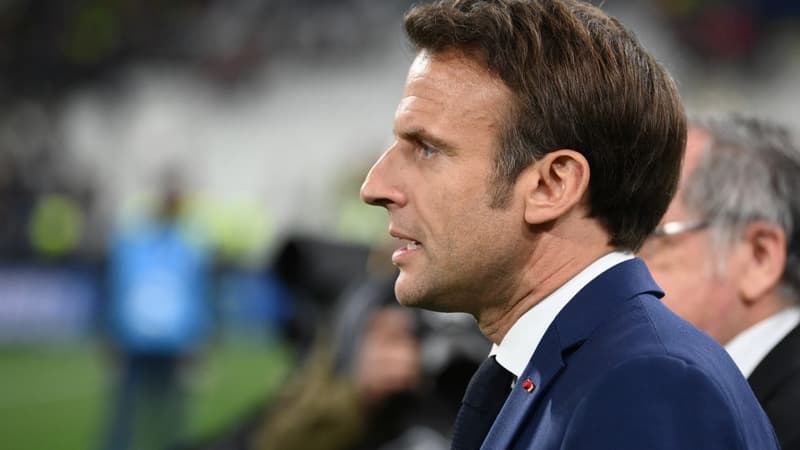A bit of lightness in a period of social and economic uncertainty. In any case, this is what Emmanuel Macron could expect if France wins the World Cup in Qatar.
A memory has remained in the memory of the political world: the rise of 18 points in the popularity index of Jacques Chirac in 1998, after the victory of the Blues in France.
Chirac’s short-lived explosion of popularity
“The president had been very involved from the beginning by visiting the players in Clairefontaine. Then, he had not lost a game. After the victory, there was a very strong jubilation that, in a way, had culminated on July 14. Garden Party around the president,” recalls Jean-François Lamour, then sports adviser at the Élysée Palace for BFMTV.com.
If this jump in the hearts of the French finally turns out to be very short-lived and only lasts a few weeks, two years later for Euro 2000, the Head of State is trying to repeat the feat. A waste of time: French footballers may have won without a doubt, Jacques Chirac lost some popularity points.
After poor results -between a team that stood out in the first round of the Euro Cup in 2008, the failure of the 2010 World Cup and a new disappointment in 2012-, the Blues regained color in 2016.
A victory in 2016 that feels good after the attacks
Despite a very good run to the final, François Hollande, who was at the bottom of the polls at the time, did not benefit from the Euro effect.
“It didn’t change much in the opinion polls, but it allowed us to close ranks, to come together 6 months after the attacks on November 13,” Patrick Kanner, then Minister of Sports, advances for BFMTV.com.
What to give a little hope to Emmanuel Macron in a difficult social and economic environment in a context of war in Ukraine? The calculation seems uncertain in the face of a competition that began with very bad omens.
The controversies have multiplied in recent weeks, both about the environmental impact of this event in the middle of the desert and about the working conditions of migrants or the rights of women and minorities.
“Do not politicize” the World Cup
Anxious to distance himself from these controversies, the president called for “not to politicize” the contest, assuring that on the climate or on human rights one had to ask “when do we award” the contests.
The move is intended to protect himself from criticism while trying to regain some of the aura of the players in the face of a good run for the Blues or even a possible victory.
“We can clearly see that we have a highly criticized World Cup with sport seeming almost secondary. When we consider from the outset that the World Cup has been lost beforehand, I find it hard to imagine that it can really bring morale back to the French and, ultimately benefit the president”, judges for his part the former president of the Union of professional football clubs Guy Contret.
“Problems” that “can break out in the hands”
Proof that Emmanuel Macron is careful to keep his distance in a controversial competition: the presidency has already announced that it will only go to Qatar if France is in the semifinals and in the final if necessary.
4 years ago in Russia, while criticism had also been strong about the organization of the World Cup, the president had only gone to Moscow for the last match of the competition between Paris and Dubrovnik. Despite the victory of the French, the popularity of the president had hardly evolved otherwise.
He knows very well that problems can fall at his feet. The objective is to support the team when things are going well, in a context that is not controversial. Otherwise, at some point it can burst in your hands. Hence the support in half tones ”, deciphers the former Minister of Sports Jean-François Lamour to BFMTV.com.
The trauma of France-Algeria in 2001
At the Élysée, we probably remember the controversy that rocked Lionel Jospin in Matignon in 2001. Three years after the euphoria of France Black Blanc Beur, Marie-Georges Buffet, then director of Sports, offered the Matinon tenant to organize a match between Algeria and France, a novelty since independence in 1962.
But on D-day, the match turns into a fiasco. In the middle of the Stade de France, the Marseillaise is whistled, just like Zinedine Zidane, but the favorite personality of the French.
After the break, hundreds of Algerian fans flooded the pitch, while the players took refuge in the locker room. In the presidential gallery packed with part of the government, Prime Minister Lionel Jospin does not move. This gives an angle of attack to the right and to the National Front, which does not hesitate for several days.
Controversy in South Africa
Another case that pushes the presidency to caution in the face of this controversial World Cup in Qatar: the elimination of France from the group stage in Knysna in 2010 in South Africa marked by the threat of a “strike” by the footballers after the exclusion of Nicolas Anelka from the team.
In front of the National Assembly, the then Minister of Sports, Roselyne Bachelot, described a team rotten by “immature bosses”, an expression that has been debated for a long time. Suffice it to say that Elysée wants to avoid any controversy of this type in an explosive social context.
“We cannot stay on the sidelines of such a global phenomenon that brings a little joy to the French who really need it and at the same time, if something goes wrong in the team, we will be blamed for it,” sighs a Renaissance deputy, near to the executive
However, the president can rest easy. Except for Jacques Chirac, Blues performances have not had a major influence on the popularity of the Presidents of the Republic, according to a ifop survey.
Source: BFM TV


